Many Monopoly players argue about what happens when you land on Free Parking, creating confusion during family game nights. The official Monopoly rules state that Free Parking gives you nothing, it’s just a safe resting spot on the monopoly board.
This guide breaks down the real Monopoly rules, exposes common myths, and explains popular house rules that change how the board game works. What does free parking mean in Monopoly? You’re about to find out.
Key Takeaways
Official Monopoly rules state Free Parking gives players nothing – it’s just a safe resting spot with no rewards or penalties.
About 75% of players use house rules that collect fines and taxes into a Free Parking jackpot system for lucky players.
House rules can turn 90-minute games into 3-hour marathons by extending gameplay and preventing player elimination through cash rewards.
Hasbro released a 2025 Monopoly Free Parking Jackpot Expansion with spinners, bonus cards, and official jackpot rules for casual play.
Different Monopoly editions handle Free Parking uniquely – Junior keeps it simple while Gamer transforms it into an active power-up station.
Table of Contents
What are the official Monopoly rules for Free Parking?
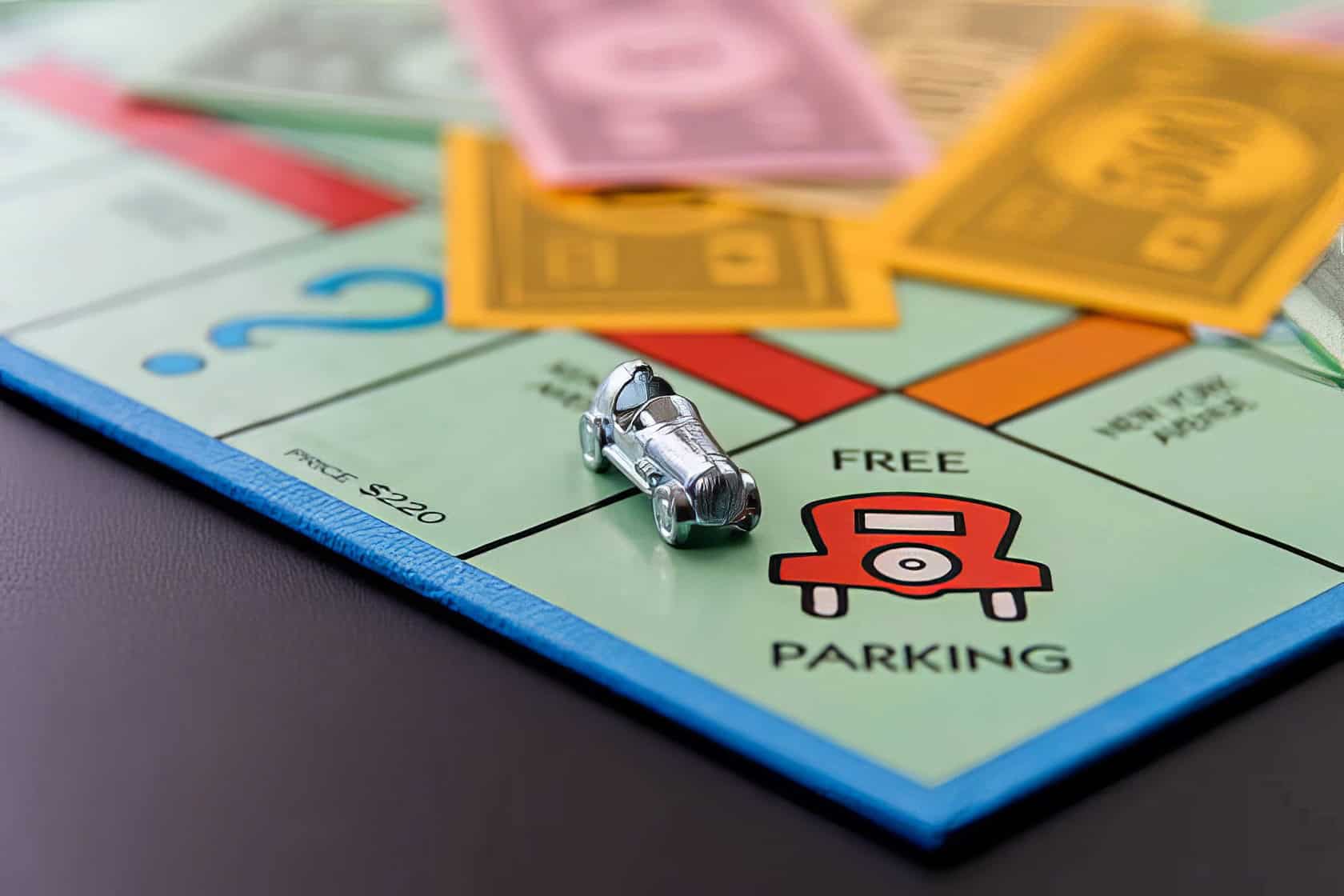
Free Parking serves as a simple resting spot on the Monopoly board game. Official rules state that nothing happens to players who land on this space. Players don’t collect money, pay fees, or receive any rewards.
The space provides a brief pause from the action… that’s it.
Hasbro confirms this rule in all official Monopoly game versions after 2017. The company offers no explanation for why Free Parking lacks special actions. This straightforward approach keeps games moving faster and prevents lengthy sessions.
Players simply place their token on the space, end their turn, and continue playing on their next roll. The myths surrounding Free Parking create confusion about what should happen next.
What are the common myths about Free Parking?
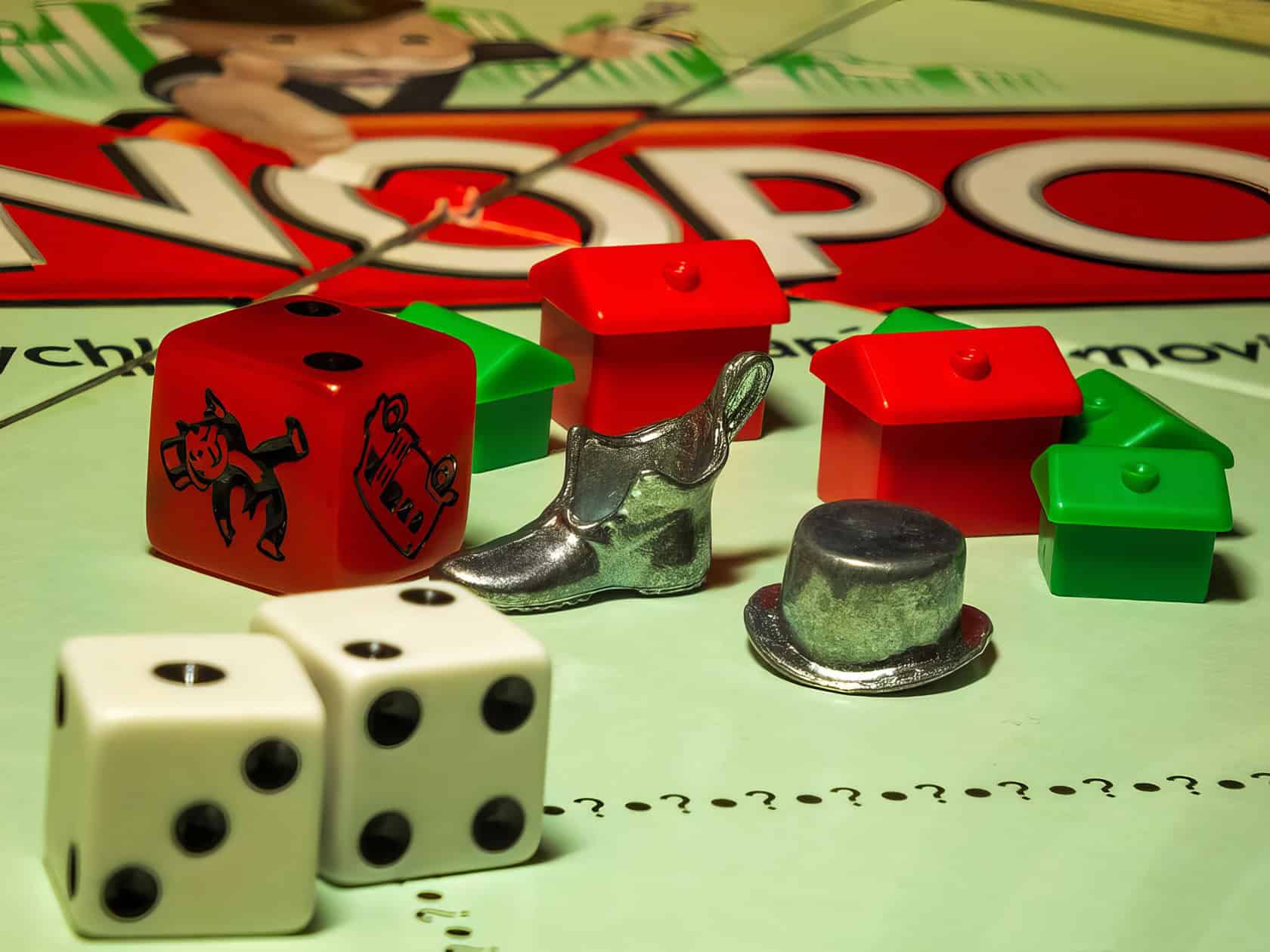
The biggest myth about Free Parking claims players collect money from taxes, chance cards, and community chest cards when landing on this corner space. This belief spreads like wildfire through family game nights, but official board game rules state clearly that Free Parking gives players nothing.
Players believing Free Parking allows collecting money from taxes, Chance cards, and other fees creates confusion, which is not in the official rules. Many families pass down this house rule through generations, treating it like gospel truth.
The belief that Free Parking provides a monetary reward is a common misconception that changes how people play Monopoly entirely.
Free Parking is just a rest stop, not a payday.
Another widespread myth suggests Free Parking acts like humanitarian aid for struggling players, similar to how some view affordable parking as a government entitlement in urban areas.
Players think this space helps balance the game by giving broke debtors a chance to avoid bankruptcy and liquidate their debts. The notion that Free Parking is beneficial reflects misunderstandings about resource scarcity and market dynamics that mirror real-world economic thinking.
Some players even believe landing on Free Parking protects them from paying rent on expensive properties like Boardwalk or Mediterranean Avenue. These myths completely ignore the original design from The Landlord’s Game, which never included monetary rewards for this space.
Popular house rules transform this simple corner into something the creators never intended.
Popular house rules for Free Parking
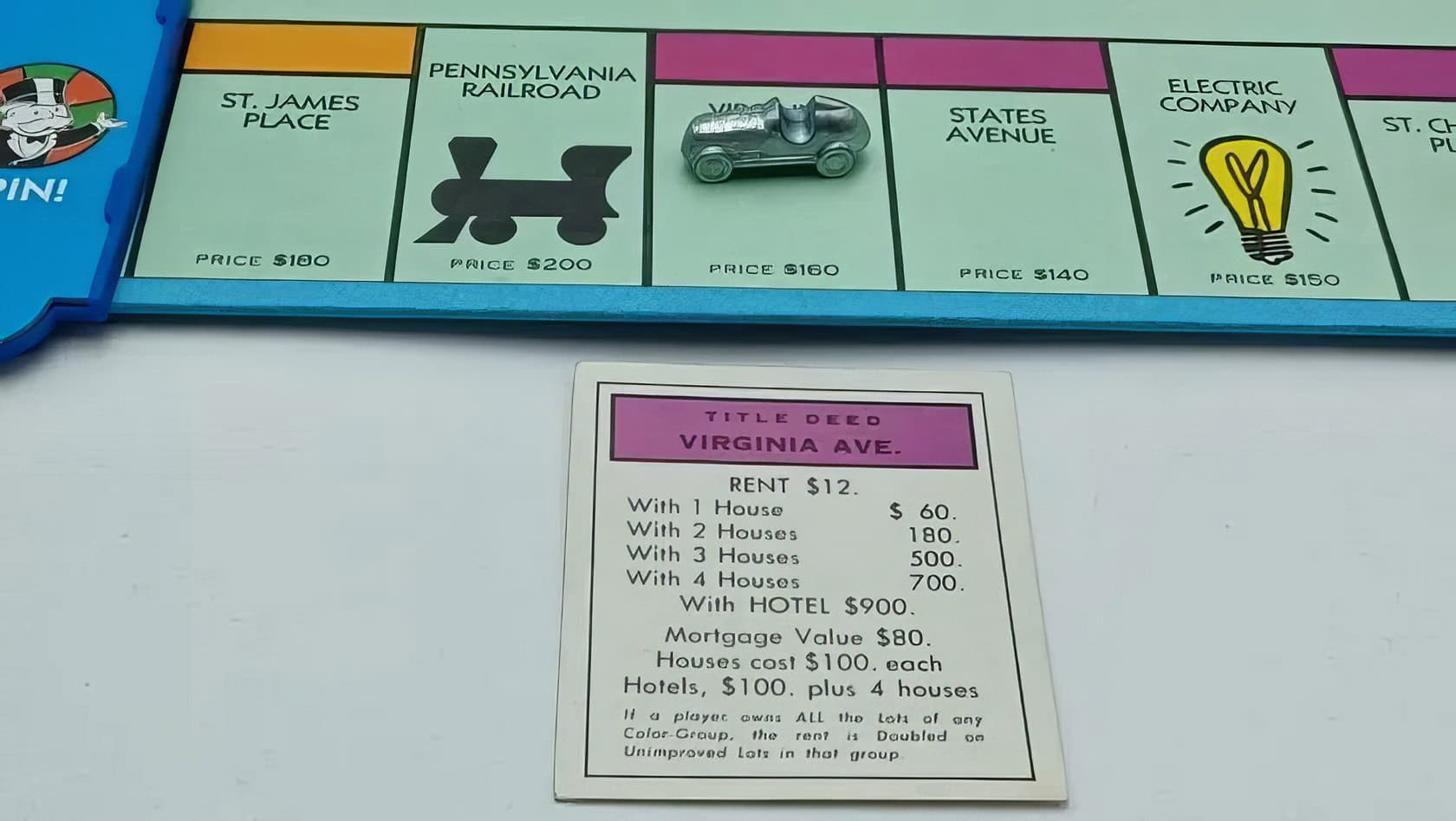
Most players ignore the official rules and create their own Free Parking jackpot system… collecting all fines, taxes, and Chance and Community Chest card penalties into one massive prize pool that grows throughout the game.
How do players collect fines and taxes in house rules?
Most families create their own money collection system for Free Parking that differs from official rules. Players place fines and taxes in the center of the board to build up a cash prize for lucky players.
- Place all income tax payments directly into the center of the board instead of returning money to the bank during regular gameplay.
- Add Chance and Community Chest card penalties to the center pile when players draw cards requiring fee payments.
- Collect luxury tax, jail fines, and property repair costs from players and stack this money in the board’s middle section.
- Gather auction fees from unsuccessful bidders and place these payments into the central money pool for future collection.
- Accumulate mortgage interest payments and property transfer fees in the center area rather than paying the bank directly.
- Stack speeding fines, parking violations, and other penalty payments from special spaces into the growing jackpot pile.
- Add snake eyes penalties and double-roll consequences to the center collection when house rules require additional payments.
- Place structured settlement fees and Mediterranean Avenue rent payments into the central pot during property transactions.
The jackpot system creates excitement as players watch the center pile grow throughout each game.
What is the jackpot system for Free Parking?
The jackpot system turns Free Parking into a money collection spot where all fines and taxes pile up. Players put money from chance and community chest cards, property taxes, and various penalties into the Free Parking space instead of paying the bank.
This creates a growing pot of cash that sits there waiting for someone to claim it.
The 2025 Monopoly Free Parking Jackpot Expansion game makes this official with new rules and components. Players who land on Free Parking can collect all money in the jackpot, draw bonus cards, or use the Deal Mobile token.
The Free Parking spinner attachment determines what happens based on red or green sections, making each landing different. This expansion includes 32 bonus cards, 20 spin chips, and 8 reminder cards for ages 8 and up, supporting 2 to 6 players in 40-minute games.
Free Parking variations in different Monopoly editions
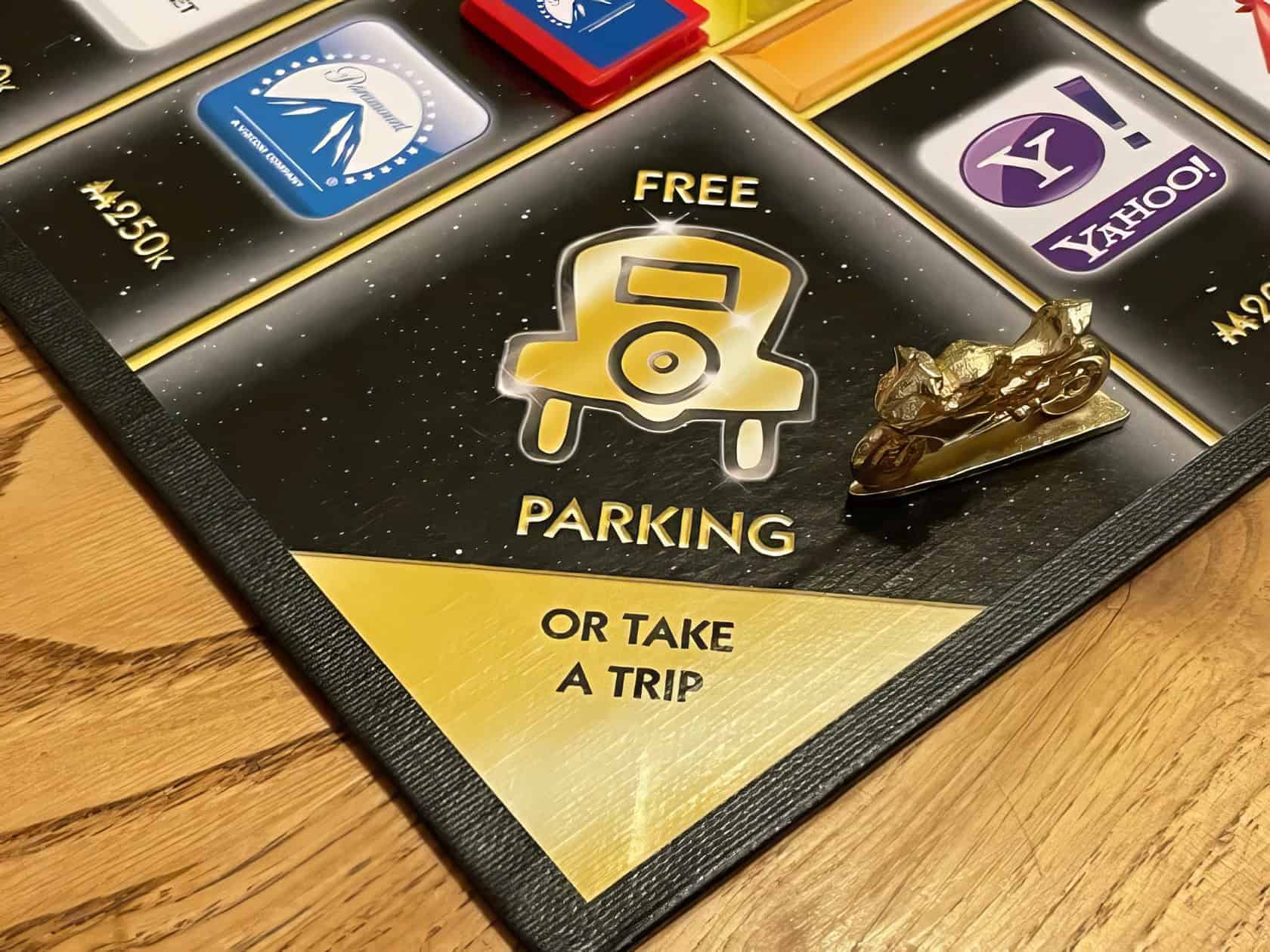
Different Monopoly editions treat Free Parking in unique ways… some versions add special features, others keep the classic approach, and a few create entirely new mechanics that change how players interact with this famous corner space.
How is Free Parking used in Monopoly Junior?
In Monopoly Junior, Free Parking works as a simple resting spot where players land without any financial rewards or penalties. This space gives kids a break from the game action, just like the traditional Monopoly rules state.
Players don’t collect money, cards, or special bonuses when they reach this corner space.
Free Parking serves as a pause in gameplay, keeping things consistent with the official Monopoly guidelines that many families ignore with house rules. The space doesn’t offer strategic advantages compared to other Monopoly editions, making it perfect for younger players who need simpler rules.
Unlike complex house rules that turn Free Parking into a jackpot system, Monopoly Junior keeps this space neutral and straightforward, similar to how when you can buy houses in Monopoly follows specific timing rules.
How does Free Parking work in Monopoly Gamer?
Monopoly Gamer transforms Free Parking into an active gameplay space that controls the Deal Mobile. Players who land on Free Parking can use the Deal Mobile for special actions, making this corner space valuable for strategic moves.
The Deal Mobile returns to Free Parking after a player gets sent to jail, creating opportunities for other players to claim control by landing on the space and spinning.
Free Parking becomes a power-up station in Monopoly Gamer, not just a rest stop.
Players collect Spin chips through Bonus cards or by choosing not to collect rent on their properties. These chips have no holding limit, and players can trade or sell them like any other game asset.
Spin chips activate the Free Parking spinner, which triggers actions like collecting money from the Jackpot space, giving players direct control over their luck rather than relying on random dice rolls.
Should you use house rules when playing Monopoly?
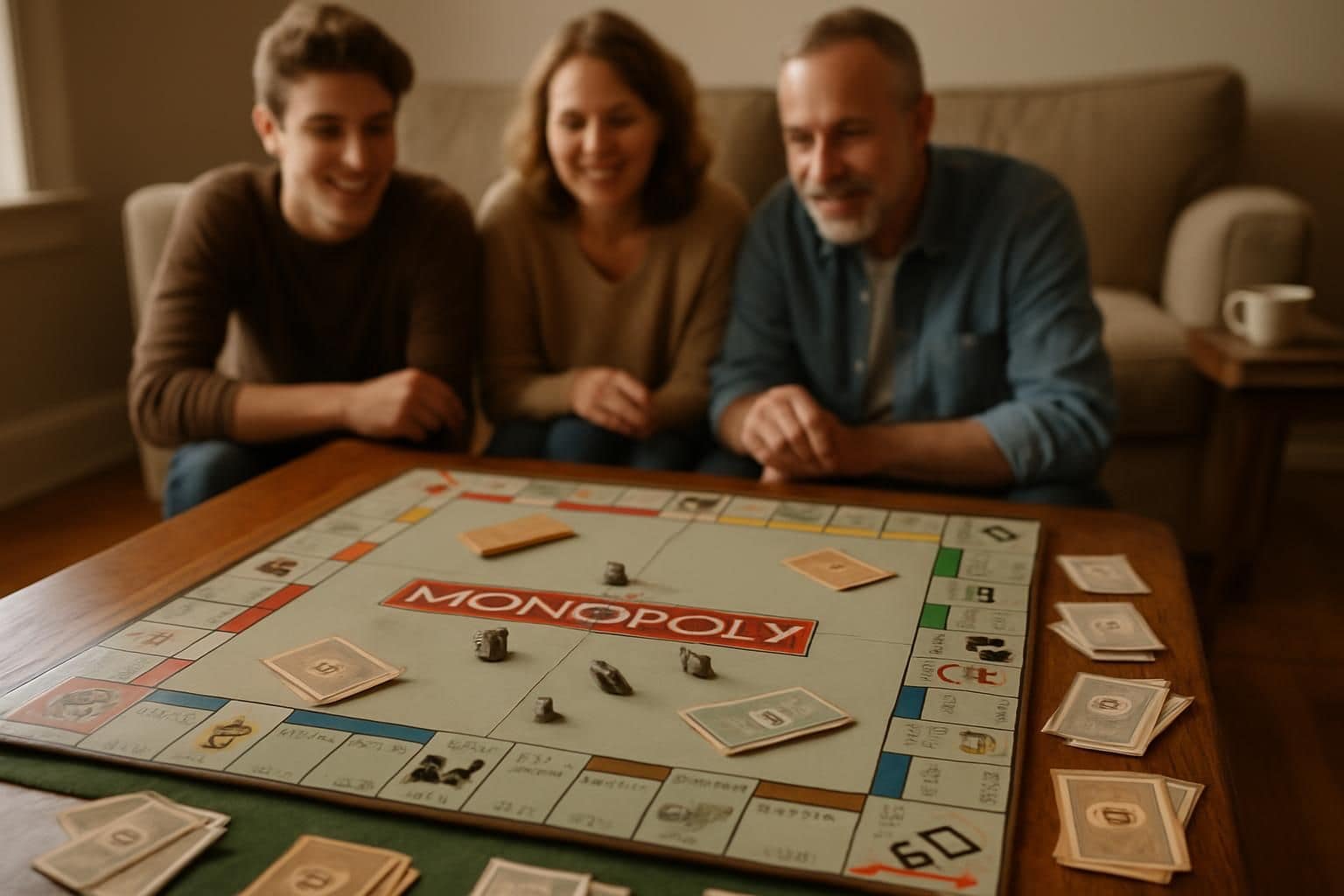
House rules make games more fun for many families, but they change the original design completely. About 75% of players use the Free Parking cash rule to help struggling players stay in the game longer.
This popular house rule collects all fines and taxes from Chance cards, Community Chest cards, and board spaces like the expensive Mediterranean Avenue property purchases.
These modifications extend game duration significantly and can turn a 90-minute game into a 3-hour marathon. House rules work great for casual family nights, but serious players should stick to official rules for competitive play.
The jackpot system creates exciting moments, yet it reduces the strategic elimination aspect that makes how to get out of jail in Monopoly decisions more critical to winning.
What are the best tips for using Free Parking in your game?
Once you decide to use Free Parking rules, smart tactics can maximize your advantage. These strategies help you gain the most benefit from this popular house rule.
- Track the center pot total throughout each turn to know exactly how much money awaits the next Free Parking visitor.
- Utilize house rules that allow collecting money from the center of the board for a financial boost during tight cash situations.
- Pay $150 to move to any space after landing on Free Parking for strategic positioning near valuable properties.
- Land on Free Parking early in the game to collect smaller amounts before other players drain the center pot.
- Count spaces carefully from your current position to increase your chances of landing on the Free Parking corner.
- Save low-value properties near Free Parking as backup income sources since players often have extra cash after collecting jackpots.
- Take advantage of Free Parking events in Monopoly GO for additional rolls and money during digital gameplay sessions.
- Be aware that using house rules may prolong the game due to the accumulation of funds, so plan for longer sessions.
How does Free Parking affect Monopoly gameplay strategy?
Officially, Free Parking does not affect gameplay strategy as it provides no rewards or penalties. Players land on this corner space, take a brief rest, and continue their movement around the board.
The official rules designate Free Parking as a neutral zone that offers no strategic value. Experienced players recognize this space provides no benefits like those from amazon.com or property acquisition opportunities similar to Mediterranean Avenue.
The time spent analyzing Free Parking strategies is ineffective under standard rules.
House rules can change Free Parking’s importance, potentially resulting in longer games and strategic adjustments. Drawing a Chance or Community Chest card upon landing on Free Parking under house rules can introduce unexpected rewards or risks.
Players develop different approaches based on jackpot systems their groups create. Some families accumulate tax money and fines into a Free Parking pot worth hundreds of dollars. Following official rules is suggested to maintain a faster pace and improve enjoyment, affecting strategic decisions.
The unpredictable nature of house rules changes this inactive space into a significant destination that alters player behavior across the entire board.
How will Free Parking house rules evolve in Monopoly games throughout 2025?
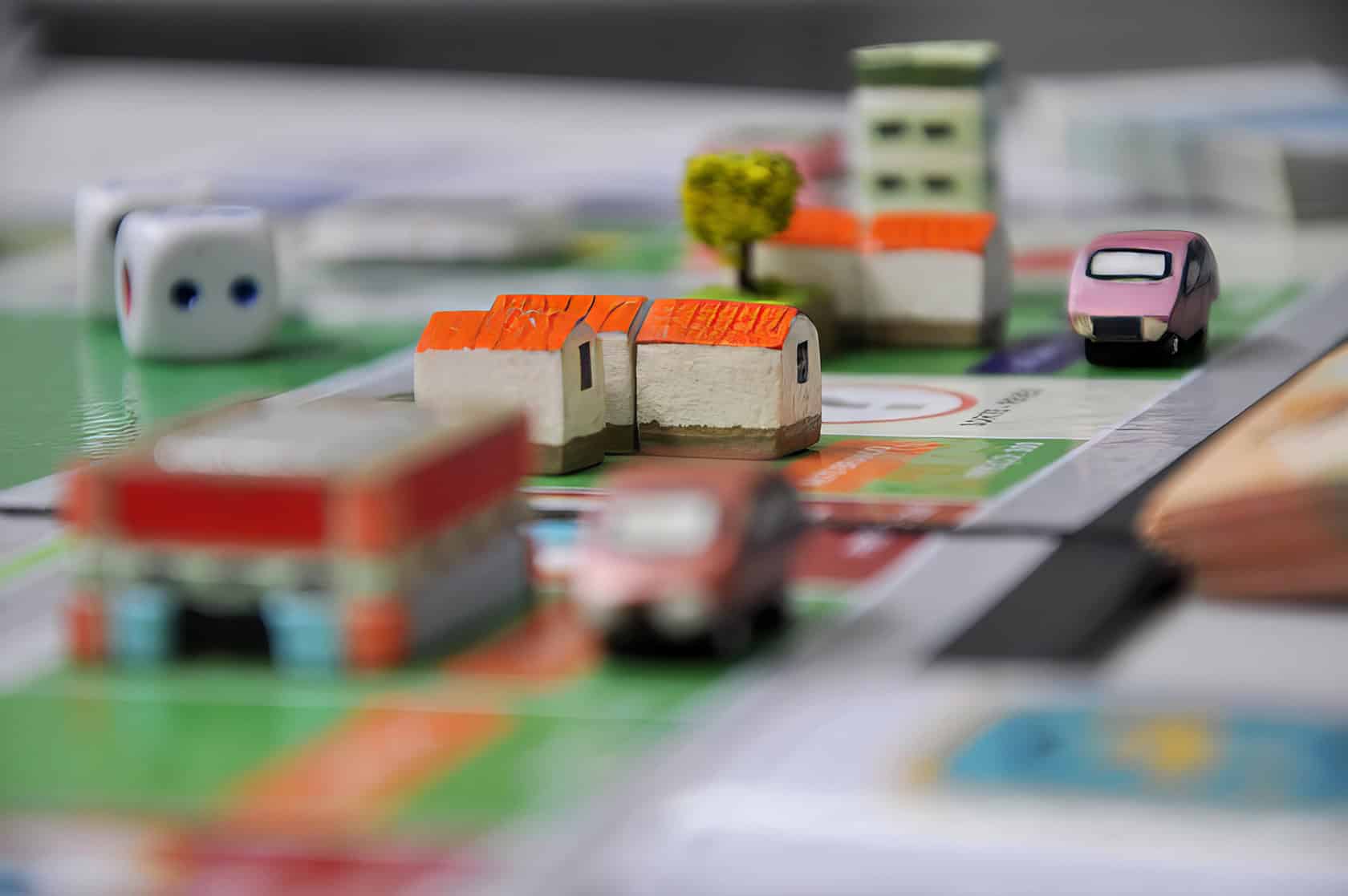
House rules for Free Parking will likely expand across digital platforms and social media communities throughout 2025. Hasbro’s release of a House Rules edition shows the company recognizes evolving gameplay traditions, which suggests official support for player modifications will grow.
Online Monopoly communities already share creative variations, from progressive jackpots that increase with each Mediterranean Avenue purchase to expense-tracking systems that mirror real-world budgeting.
Digital Monopoly apps will probably integrate customizable Free Parking options, letting players vote on rules before games start. The popular “kitty” system for collecting fines will evolve into more complex variations, including charity donations to organizations supporting causes like Gaza relief efforts.
Players might create themed rules based on pop culture, such as “Ozzy’s Rock Star Jackpot” where landing on Free Parking triggers music-based challenges. Game manufacturers will continue acknowledging these player-driven innovations, making house rules a standard feature rather than unofficial modifications.
People Also Ask
What does Free Parking actually do in Monopoly?
Free Parking is just a rest space. Players land there, collect no money, and wait for their next turn.
Do you get money when you land on Free Parking?
No, the official rules say you get nothing. Many families play with house rules that give cash, but that’s not how the game works.
What happens to tax money and fines in real Monopoly?
All tax payments and fines go to the bank, not Free Parking. This includes money from Chance cards, Community Chest penalties, and property taxes.
Why do people think Free Parking gives you money?
House rules spread this myth over time. Families wanted to make the game last longer, so they put collected money under Free Parking for lucky players to win.
References
https://www.wikihow.com/Free-Parking-Monopoly (2025-04-10)
https://www.aei.org/articles/the-myth-of-free-parking/
https://en.wikibooks.org/wiki/Monopoly/House_Rules
https://www.geekyhobbies.com/monopoly-free-parking-jackpot-rules/ (2025-01-24)
https://boardgamegeek.com/thread/1805609/free-parking-in-this-edition
https://monopoly.fandom.com/wiki/Free_Parking
https://myfox8.com/news/have-you-been-using-this-monopoly-space-wrong/
https://www.mirror.co.uk/news/weird-news/hasbro-addresses-monopoly-free-parking-34365031 (2024-12-23)
https://boardgamegeek.com/thread/3143513/house-rule-free-parking (2023-08-27)
